#Web Development Roadmap
Explore tagged Tumblr posts
Text
9 FAQs to ask your web developer These 9 FAQs can help you make an informed choice of a competent web development team before allocating the project.

#Custom Web Development#Web Development Roadmap#SEO Friendly Website Development#Website Development Company#Web Developer
0 notes
Text
What is coding for kids
#web development#front end web development#web development roadmap#web development guide#learn web development#app development#backend web development#full stack web development#software development#development#web development tutorial#web development projects#web development tutorial for beginners#what is web development#web development course#web development skills
1 note
·
View note
Text
Helpful Insight is a full-service UI/UX design agency and branding firm based in Bharat. We work with the industry's best tech companies and well-funded startups from scratch. Our UX designers are known for understanding behavioral science with user-centered art to create unique digital experiences and content with user interfaces that are fun to use and perfectly showcase the company’s image.
In the market, it’s crucial to have a visually appealing and high-performing embedded User Interface Design Solution. This can make all the difference, between getting attention or being overlooked. At Helpful Insight Bharat we are dedicated to assisting our customers in realizing their vision, for embedded user interface (UI). Find out why our customers appreciate collaborating with us and rely on us to unlock the potential of their products’ UI experiences. In this, we read about UI/UX Designing information.
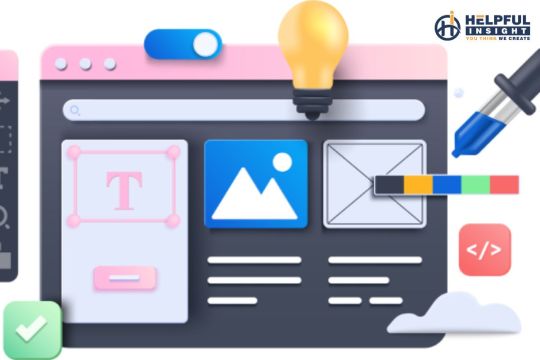
#web development blog#web development instagram#web development courses#web development jobs#web development company#web development introduction#web development software#web development roadmap
0 notes
Text
🚀 Unlock the Fullstack Web Development Adventure! 🌐🚀
Ready to dive headfirst into the world of coding, databases, and dynamic websites? Look no further! 🖥️💼
Introducing the REDOT ACADEMY Fullstack Web Development Internship - Your gateway to becoming a versatile tech wizard! 💻🌟
📌 What You Can Expect: ✅ Front-end and Back-end Development ✅ Hands-on Coding Experience ✅ Real Projects and Problem-Solving ✅ Expert Mentorship ✅ The Ultimate Fullstack Portfolio
Whether you're a coding newbie or aiming to enhance your skills, our internship program is your golden ticket to building a robust foundation in web development. 💡
Don't miss out on this incredible opportunity to learn, grow, and prepare for a future where tech is king! 👩💻👨💻🚀
Apply now and embark on your journey towards becoming a Fullstack Web Development pro! 🌐👏
#RedotAcademy #FullstackWebDevelopment #InternshipOpportunity #CodeLikeAPro #TechJourney #WebDevSkills #LearnWithUs
#web development#full stack web development#web development roadmap#what is full stack web development#full stack web development course#web development full course#web development course#web development for beginners#learn full stack web development#full stack development#full stack web development full course#web development 2023#web development guide#front end web development#web developer
1 note
·
View note
Text
How can we learn how web development works
How can we learn: Today we will tell you what is web development, so that you will understand what we need for it. How can we learn To know how web development works, you can follow these steps: Start with the basics: Familiarize yourself with HTML (Hypertext Markup Language) and CSS (Cascading Style Sheets), the building blocks of web pages. Learn JavaScript: JavaScript is a programming…

View On WordPress
#app development#career in web development#development#front end web development#full stack development#full stack web development#full stack web development course#How can students learn?#learn web development#web development#web development 2023#web development career in india#web development course#web development full course#web development guide#web development roadmap#web development skills#web development tutorial#web development tutorial for beginners#What are 4 ways to learn?#What are the 5 ways you can learn?#What is the best way to learn?
1 note
·
View note
Text
Web Development Roadmap for Beginners 2023
New Post has been published on https://www.codesolutionstuff.com/web-development-roadmap-for-beginners/
Web Development Roadmap for Beginners 2023
Are you interested in learning web development but don't know where to start? In this blog post, we'll provide a comprehensive roadmap for beginners to learn web development in 2023. We'll cover everything from the basics of HTML and CSS to advanced topics like React and Node.js. Whether you're a
#Back-end development#Beginner&039;s guide#front-end development#Full-stack development#programming#Roadmap#WEB DEVELOPMENT#Web Development Roadmap
0 notes
Text
A structured way to learn JavaScript.
I came across a post on Twitter that I thought would be helpful to share with those who are struggling to find a structured way to learn Javascript on their own. Personally, I wish I had access to this information when I first started learning in January. However, I am grateful for my learning journey so far, as I have covered most topics, albeit in a less structured manner.
N/B: Not everyone learns in the same way; it's important to find what works for you. This is a guide, not a rulebook.
EASY
What is JavaScript and its role in web development?
Brief history and evolution of JavaScript.
Basic syntax and structure of JavaScript code.
Understanding variables, constants, and their declaration.
Data types: numbers, strings, boolean, and null/undefined.
Arithmetic, assignment, comparison, and logical operators.
Combining operators to create expressions.
Conditional statements (if, else if, else) for decision making.
Loops (for, while) for repetitive tasks. - Switch statements for multiple conditional cases.
MEDIUM
Defining functions, including parameters and return values.
Function scope, closures, and their practical applications.
Creating and manipulating arrays.
Working with objects, properties, and methods.
Iterating through arrays and objects.Understanding the Document Object Model (DOM).
Selecting and modifying HTML elements with JavaScript.Handling events (click, submit, etc.) with event listeners.
Using try-catch blocks to handle exceptions.
Common error types and debugging techniques.
HARD
Callback functions and their limitations.
Dealing with asynchronous operations, such as AJAX requests.
Promises for handling asynchronous operations.
Async/await for cleaner asynchronous code.
Arrow functions for concise function syntax.
Template literals for flexible string interpolation.
Destructuring for unpacking values from arrays and objects.
Spread/rest operators.
Design Patterns.
Writing unit tests with testing frameworks.
Code optimization techniques.
That's it I guess!
789 notes
·
View notes
Text
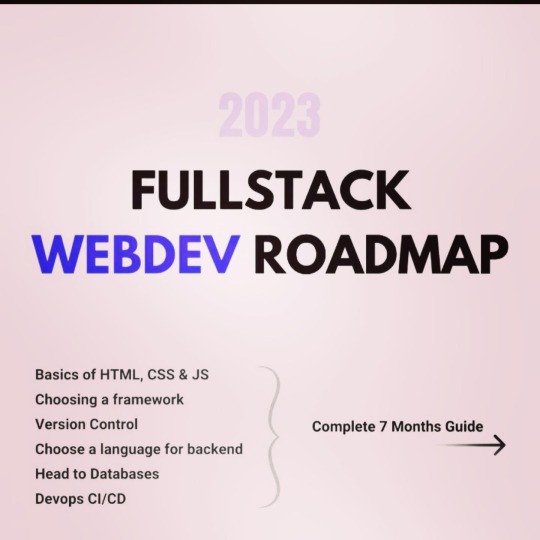
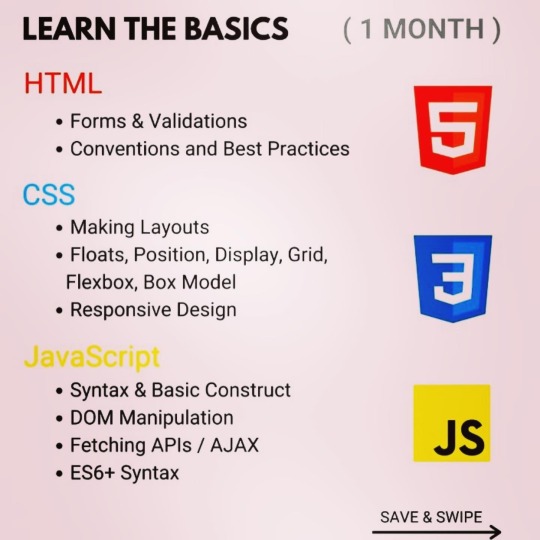
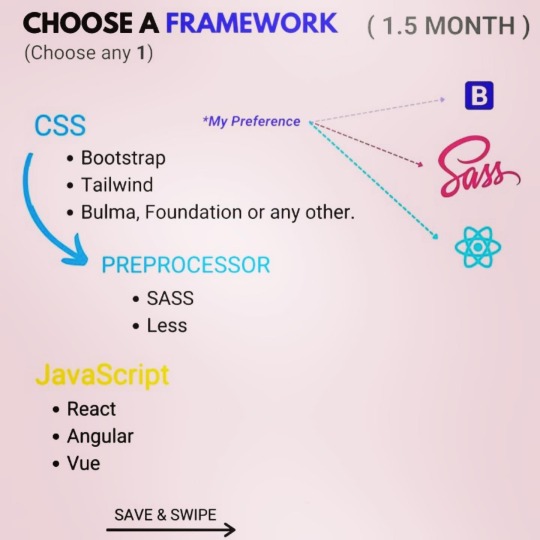
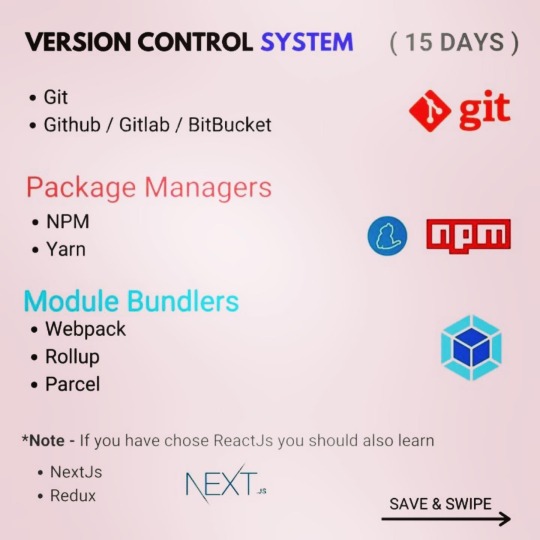
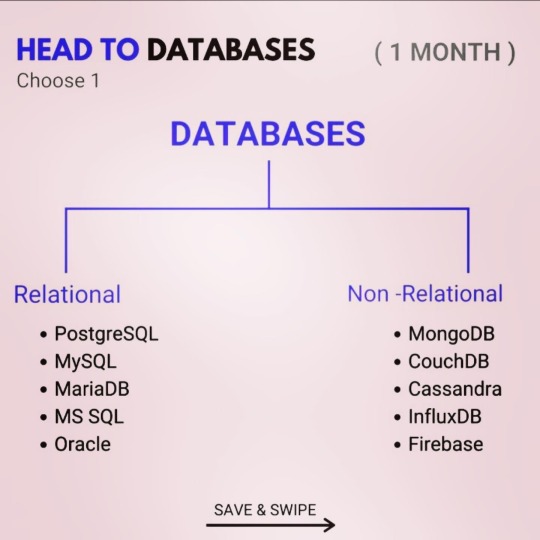
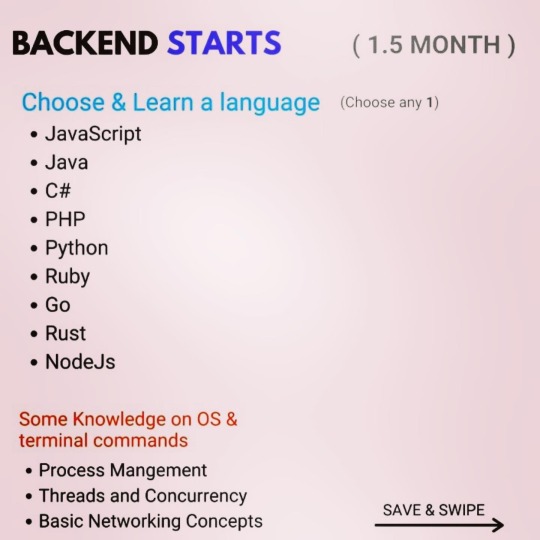
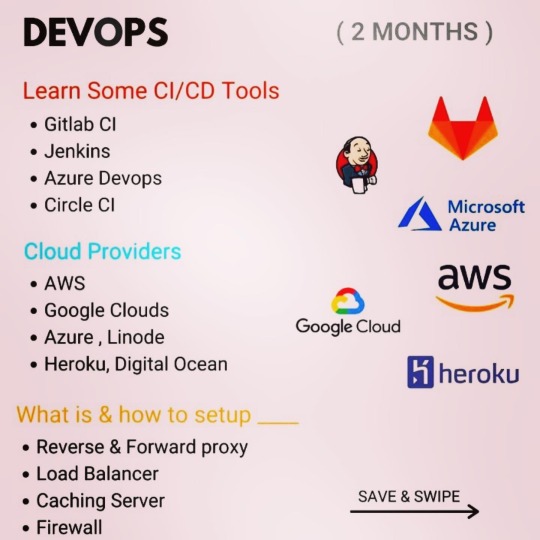
Web Development Roadmap
#surya kulshreshtha#surya#kulshreshtha#suryakulshreshtha#technology#india#programming#android#life#coding#web development#roadmap
3 notes
·
View notes
Text
Master DevOps: Your Complete Guide and Roadmap | DevOps Online Training

Introduction to DevOps
In today's rapidly evolving technological landscape, the need for streamlined and efficient software development practices has never been greater. Enter DevOps—a culture, philosophy, and set of practices that bring development (Dev) and operations (Ops) together to improve collaboration, integration, and automation throughout the software development lifecycle. DevOps is not just a buzzword; it's a transformative approach that enables organizations to deliver high-quality software faster and more reliably. If you're looking to build a career in this field, DevOps Online Training is your gateway to mastering the skills required to excel in this domain.
What is DevOps?
DevOps is a combination of practices, tools, and cultural philosophies designed to increase an organization's ability to deliver applications and services at high velocity. By breaking down the traditional silos between development and operations teams, DevOps fosters a culture of collaboration, where both teams work together throughout the entire software development lifecycle. This collaboration leads to faster development, more frequent deployment of updates, and higher overall software quality.
At its core, DevOps emphasizes automation, continuous integration, continuous delivery (CI/CD), and monitoring. The goal is to minimize manual intervention, reduce errors, and improve the efficiency of software development and deployment. Through DevOps Online Training, you can learn how to implement these practices in real-world scenarios, making you an invaluable asset to any tech organization.
How DevOps Works
DevOps is built on a set of principles and practices that enable organizations to build, test, and deploy software rapidly and efficiently. Here's how DevOps works in practice:
1. Continuous Integration and Continuous Deployment (CI/CD)
Continuous Integration (CI) is the practice of merging code changes frequently, often multiple times a day, into a shared repository. Automated testing is then conducted to identify and resolve issues early in the development process. Continuous Deployment (CD) takes this a step further by automatically deploying code changes to production after passing the CI pipeline. Together, CI/CD reduces the time between writing code and delivering it to customers, ensuring that software updates are released frequently and reliably.
2. Automation
Automation is a critical component of DevOps. From building and testing code to deploying and monitoring applications, automation helps streamline the entire software development lifecycle. By automating repetitive tasks, teams can focus on more strategic activities, such as optimizing code and improving system performance. Automation tools like Jenkins, Ansible, and Puppet are commonly used in DevOps to create efficient, repeatable processes.
3. Infrastructure as Code (IaC)
Infrastructure as Code (IaC) is the practice of managing and provisioning computing infrastructure through machine-readable scripts rather than manual processes. This approach allows teams to automate the setup and configuration of environments, ensuring consistency across development, testing, and production stages. Tools like Terraform and AWS CloudFormation are popular choices for implementing IaC.
4. Monitoring and Logging
Effective monitoring and logging are essential to maintaining the health and performance of applications in a DevOps environment. By continuously monitoring systems and capturing logs, teams can identify and resolve issues before they impact end-users. Tools like Prometheus, Grafana, and ELK Stack are widely used for monitoring and logging in DevOps.
5. Collaboration and Communication
DevOps is as much about culture as it is about technology. A key aspect of DevOps is fostering a culture of collaboration and communication between development, operations, and other stakeholders. This collaboration ensures that everyone is aligned with the project's goals and that issues are addressed quickly. Tools like Slack, Microsoft Teams, and Jira facilitate communication and collaboration in a DevOps environment.
6. Security in DevOps (DevSecOps)
As security becomes increasingly important in software development, DevOps practices have evolved to include security as a core component. DevSecOps integrates security into every stage of the software development lifecycle, ensuring that security vulnerabilities are identified and addressed early in the process. By adopting DevSecOps practices, organizations can build more secure applications without compromising on speed and agility.
The Roadmap to Becoming a DevOps Engineer
Becoming a DevOps engineer requires a combination of technical skills, practical experience, and a deep understanding of DevOps principles. Here's a step-by-step roadmap to guide you on your journey:
1. Understand the Basics of DevOps
Before diving into specific tools and technologies, it's important to understand the fundamental principles of DevOps. Learn about the core concepts of CI/CD, automation, IaC, and monitoring. DevOps Online Training can provide you with a solid foundation in these areas, helping you grasp the essential elements of DevOps.
2. Gain Proficiency in Programming and Scripting
A strong foundation in programming and scripting is essential for a DevOps engineer. Start by learning a programming language like Python, Ruby, or Go, as well as scripting languages like Bash or PowerShell. These skills will enable you to automate tasks, write custom scripts, and work with various DevOps tools.
3. Master Version Control Systems
Version control systems (VCS) like Git are critical to DevOps practices. Learn how to use Git for version control, branching, and merging code. Understand how to collaborate with other developers using GitHub, GitLab, or Bitbucket. Version control is a fundamental skill that every DevOps engineer must possess.
4. Get Hands-On with CI/CD Tools
CI/CD is at the heart of DevOps, so gaining hands-on experience with CI/CD tools is crucial. Learn how to set up and configure Jenkins, CircleCI, or Travis CI to automate the build, test, and deployment processes. DevOps Online Training often includes practical labs and exercises that allow you to practice using these tools in real-world scenarios.
5. Learn About Infrastructure as Code (IaC)
IaC is a key practice in DevOps, enabling teams to manage and provision infrastructure programmatically. Familiarize yourself with IaC tools like Terraform, AWS CloudFormation, and Ansible. Learn how to write scripts that automate the creation and configuration of infrastructure, ensuring consistency across environments.
6. Develop Cloud Computing Skills
Cloud computing is an integral part of DevOps, as it provides the scalability and flexibility needed for modern software development. Gain proficiency in cloud platforms like AWS, Azure, or Google Cloud. Learn how to deploy applications to the cloud, manage cloud resources, and work with cloud-based DevOps tools.
7. Enhance Your Automation Skills
Automation is a cornerstone of DevOps, so it's essential to master automation tools and techniques. Learn how to automate tasks using tools like Jenkins, Puppet, and Chef. Understand how to create automated workflows that integrate with other DevOps tools and processes.
8. Learn About Monitoring and Logging
Effective monitoring and logging are crucial for maintaining the health of applications in a DevOps environment. Familiarize yourself with monitoring tools like Prometheus and Grafana, as well as logging tools like the ELK Stack. Learn how to set up monitoring dashboards, create alerts, and analyze logs to identify and resolve issues.
9. Embrace DevSecOps Practices
Security is a critical aspect of DevOps, and understanding DevSecOps practices is essential for a successful career in this field. Learn how to integrate security into the CI/CD pipeline, conduct security testing, and implement security best practices throughout the software development lifecycle.
10. Gain Practical Experience
Theory alone is not enough to become a proficient DevOps engineer. Hands-on experience is crucial. Work on real-world projects, contribute to open-source DevOps projects, or participate in internships. Practical experience will help you apply the skills you've learned and build a portfolio that showcases your expertise.
11. Obtain DevOps Certifications
Certifications can validate your skills and make you stand out in the job market. Consider obtaining certifications like AWS Certified DevOps Engineer, Google Cloud DevOps Engineer, or Microsoft Certified: Azure DevOps Engineer Expert. These certifications demonstrate your proficiency in DevOps practices and tools.
12. Stay Updated with Industry Trends
The field of DevOps is constantly evolving, with new tools and practices emerging regularly. Stay updated with industry trends by reading blogs, attending conferences, and participating in online communities. DevOps Online Training programs often include updates on the latest trends and tools in the industry.
13. Build a Strong Professional Network
Networking is important in any career, and DevOps is no exception. Join DevOps communities, attend meetups, and connect with other professionals in the field. Building a strong network can lead to job opportunities, collaborations, and valuable insights.
14. Prepare for DevOps Interviews
As you near the end of your learning journey, it's time to prepare for DevOps interviews. Practice common DevOps interview questions, participate in mock interviews, and review your projects and experiences. DevOps Online Training programs often include interview preparation sessions to help you succeed in landing your first DevOps job.
Conclusion
DevOps is a powerful approach that has revolutionized the way software is developed, tested, and deployed. By fostering collaboration between development and operations teams and leveraging automation, CI/CD, and cloud computing, DevOps enables organizations to deliver high-quality software at a rapid pace. Whether you're just starting your career or looking to transition into the field, DevOps Online Training can provide you with the skills and knowledge needed to succeed as a DevOps engineer.
By following the roadmap outlined in this article, you can develop the technical expertise, practical experience, and industry knowledge required to excel in DevOps. Remember to stay updated with the latest trends, build a strong network, and continuously improve your skills.
#devops#devopsonlinetraining#devops engineer#DevOps Roadmap#web development#development#software#Continuous Integration#Continuous Deployment#Cloud Computing#Automation#Software Development#IT Training#cicd#it training institute#it training courses#it training classes
0 notes
Text
HOW TO BECOME A SITECORE DEVELOPER IN 2024
Are you interested in becoming a Sitecore developer in 2024? Follow these essential steps to kickstart your career: 1) Learn the Basics:
C# and .NET: Sitecore is built on the .NET framework, so proficiency in C# and .NET is crucial.
CMS Fundamentals: Understand the core principles of content management systems, including content creation, management, and publishing. 2) Gain Sitecore Knowledge:
Official Documentation: Start with Sitecore's official documentation and tutorials.
Sitecore Academy: Enroll in Sitecore's online courses and certifications for formal training. 3) Hands-On Experience:
Practice Projects: Work on sample projects or contribute to open-source Sitecore projects.
Internships: Seek internships or junior developer positions for real-world experience. 4) Certifications:
Sitecore Certifications: Obtain Sitecore certifications to validate your skills and knowledge. 5) Join the Community:
Forums and User Groups: Engage with the Sitecore community through forums, user groups, and events.
Stay Updated: Keep up with the latest trends and updates in Sitecore development.
By following these steps, you'll be well on your way to becoming a skilled Sitecore developer, ready to take on the challenges and opportunities of 2024.
#sitecore#developer#sitecore developer#sitecore cms#web developers#software developer#web development#cms#career#sitecore jobs#how to#tutorial#roadmap
0 notes
Text
Exploring Fault Proofs in Optimism: An Overview

The activation of fault proofs by Optimism marks a significant advancement in Ethereum Layer 2 scaling solutions, completing the first stage of its decentralization plan. This milestone is pivotal for enhancing the network's security and trustlessness, reducing reliance on centralized entities like the Optimism Security Council. Previously, the council monitored transactions and intervened to prevent fraud, but with the new fault proof system, any party can now challenge transactions, moving towards a more decentralized and inclusive network.
Ethereum's high transaction fees have made Layer 2 scaling solutions, such as rollups, essential. Optimism's fault proofs ensure that off-chain transactions are valid by allowing a challenge period where anyone can contest a transaction's validity. If a challenge is raised, a fault proof is provided and verified by the Ethereum mainnet, ensuring that invalid transactions are reverted.
This process significantly enhances the security and integrity of the blockchain. Unlike Arbitrum, which relies on 12 validators, Optimism's fault proof system is designed to be trustless and decentralized, enabling broader participation in transaction verification.
Despite initial challenges with proof generation and verification speeds, Optimism has optimized its fault proof mechanisms to be compatible with Ethereum's Layer 1. This achievement not only improves the security and decentralization of the network but also sets a benchmark for other rollup technologies.
The activation of fault proofs highlights the importance of continuous innovation and rigorous testing in the blockchain space. For more in-depth insights and exclusive research, join our Web3 Sync community on Intelisync and Learn more...
#Batching Transactions#Challenge Window#Challenges and Criticisms#Criticism Addressed#cryptographic proofs#Decentralization Roadmap#Ethereum Layer 2 scaling solutions#fault proof#fault proof mechanism#Fault Proofs Milestone#Future Outlook#How Optimism Worked Before Fault Proofs#Optimism Achieves a Major Milestone#Optimism Implements Fault Proofs#Optimism’s Decentralization Roadmap#optimistic and zk-rollups#Proof Verification#Reversion of Invalid Transactions#Technical Challenges#The Importance and Issues of Fault Proofs#The Necessity of Layer 2 Scaling#Understanding Fault Proofs in Optimism#blockchain development companies#web3 development#metaverse development company#blockchain development services#metaverse game development#web 3.0 marketing#crypto app development#cryptocurrency development companies
0 notes
Text
Your Roadmap to WordPress Website Development in 2024
Within the ever-evolving field of web development, WordPress remains a unique platform supporting millions of websites globally. There has never been more of a need for high-performance websites as we approach 2024. We will dive into the complexities of WordPress development in this in-depth book, covering cutting-edge techniques to create websites that not only impress visitors but also excel in functionality, performance, and security.

Understanding WordPress Development:
Since its launch, WordPress has advanced significantly, becoming a feature-rich content management system (CMS) that is appreciated by both companies and developers. By 2024, the platform will provide unmatched scalability, versatility, and user-friendliness. We’ll examine the most recent developments in WordPress development and how they’re influencing the creation of high-performing websites.
WordPress Website Design Strategies:
In a time where the user experience is paramount, responsive design is an absolute must. We’ll explore the fundamentals of user-centric design and talk about utilizing contemporary design components to produce aesthetically attractive WordPress websites that function flawlessly on a variety of devices read more.
0 notes
Text
Web development projects with source code
#web development#front end web development#web development roadmap#web development guide#learn web development#backend web development#full stack web development#software development#development#web development tutorial for beginners#what is web development#web development course#web development skills
1 note
·
View note
Text
Customized web development involves the creation of personalized websites for business corporations and even at personal levels. We develop sites that suit the specs of a client necessitating having a deep knowledge of code, design, and so forth. This is an area in which we stand among UK customized web development firms that have expertise with varied web development options provided by them to their clients. We have experience in dynamic web design to give their customers what is needed, e-commerce, blog, information, or any other custom solution. In addition, our organization offers clients web hosting, domain name registration, and other additional services in connection to digital products. Our team of professionals knows everything about the latest web technologies and is dedicated to producing high-quality, secure, and user-centric websites. Businesses can also access custom web development companies from Bharat and the UK so that they get websites that will assist them in achieving their aims and objectives.
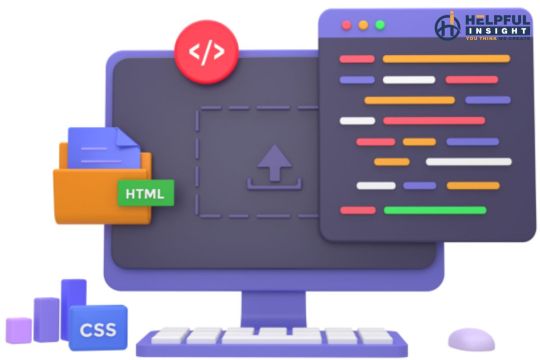
#web development blog#web development instagram#web development courses#web development jobs#web development company#web development introduction#web development software#web development roadmap
0 notes
Text
Desarrollo de aplicaciones móviles: Protegiendo tu trabajo del plagio
Desarrollo de aplicaciones móviles: Protegiendo tu trabajo del plagioEl desarrollo de aplicaciones móviles se ha convertido en una industria lucrativa, con empresas buscando formas de crear aplicaciones que puedan ayudarles a llegar a su público objetivo.
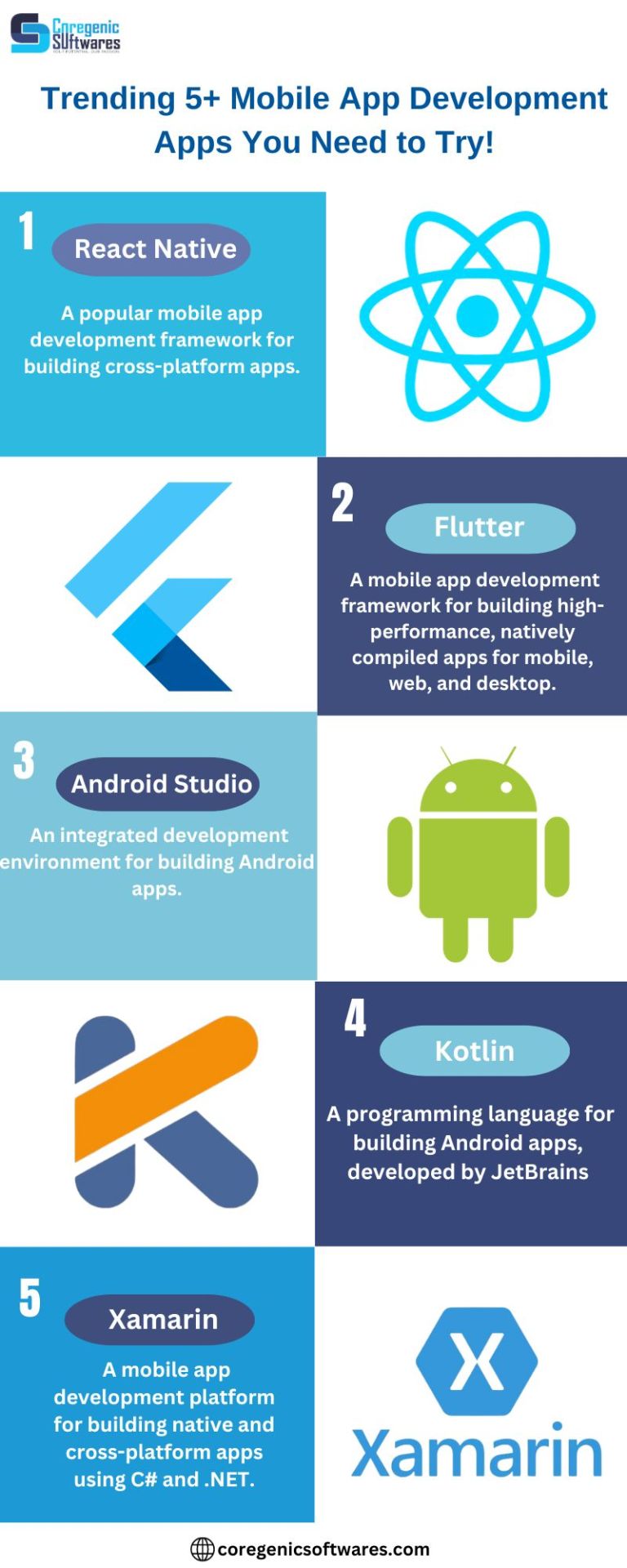
Las aplicaciones de desarrollo de aplicaciones móviles han surgido como una solución a este problema. Estas aplicaciones están diseñadas para ayudar a las empresas a crear aplicaciones móviles sin la necesidad de habilidades de codificación o programación.
Sin embargo, con la creciente demanda de aplicaciones móviles, el plagio se ha convertido en una preocupación importante para los desarrolladores de aplicaciones.
En este artículo, discutiremos cómo proteger tu cartera de desarrollo de aplicaciones móviles del plagio y el uso no autorizado.
Protección de derechos de autor:
Una de las formas más simples de afirmar tu propiedad sobre tu cartera de desarrollo de aplicaciones móviles es utilizar avisos de derechos de autor.
La protección de derechos de autor es una salvaguarda legal esencial para tu cartera de desarrollo de aplicaciones móviles. Te otorga derechos exclusivos sobre tu trabajo original y prohíbe a otros copiar, distribuir o utilizar tu aplicación sin permiso.
Registrar tu aplicación móvil con la oficina de derechos de autor relevante proporciona protección legal adicional y fortalece tu caso contra posibles infractores.
Marcas comerciales y patentes:
Otra forma de proteger tu cartera de desarrollo de aplicaciones móviles es solicitar marcas comerciales y patentes. Las marcas comerciales protegen tu nombre de marca, logotipo y otras características identificativas, mientras que las patentes protegen las características y funcionalidades únicas de tu aplicación.
Solicitar marcas comerciales y patentes puede ser un proceso largo y costoso, pero proporciona protección legal adicional y fortalece tu caso contra posibles infractores.
Monitoreo y aplicación:
Monitorea y hace cumplir regularmente tus derechos sobre tu cartera de desarrollo de aplicaciones móviles. Puedes utilizar herramientas y servicios en línea como Google Alerts, Copyscape o Plagiarism Checker para rastrear y detectar cualquier instancia de plagio o uso no autorizado de tu trabajo.
También puedes unirte a asociaciones o redes profesionales como la App Developers Alliance o la International Game Developers Association que proporcionan recursos y apoyo para proteger tu propiedad intelectual.
Innovación continua:
Mantenerse por delante de la competencia es esencial para proteger tu cartera de desarrollo de aplicaciones móviles. Innova y actualiza continuamente tus aplicaciones con nuevas características, medidas de seguridad mejoradas e interfaces amigables para el usuario.
Al ofrecer una experiencia de usuario superior, no solo atraes a usuarios leales, sino que también estableces una reputación de calidad, lo que hace menos probable que otros intenten copiar tu trabajo.
Conclusión:
Las aplicaciones de desarrollo de aplicaciones móviles se han convertido en una parte esencial del mundo digital.
Estas aplicaciones proporcionan a las empresas una forma rentable, que ahorra tiempo, fácil de usar, personalizable y accesible de crear aplicaciones móviles.
Sin embargo, con la creciente demanda de aplicaciones móviles, el plagio se ha convertido en una preocupación importante para los desarrolladores de aplicaciones.
Proteger tu cartera de desarrollo de aplicaciones móviles del plagio y el uso no autorizado es esencial para mantener tu ventaja competitiva en el mundo digital.
Al utilizar avisos de derechos de autor, solicitar marcas comerciales y patentes, monitorear y hacer cumplir tus derechos y continuar innovando, puedes proteger tu trabajo y establecer una reputación de calidad. Get more details about Mobile App Development then check it out: WWW.COREGENICSOFTWARES.COM
#Desarrollo de aplicaciones móviles#mobile app development#mobile development#ios development#mobile app development for beginners#mobile developer#app development roadmap#app development for beginners#mobile app development in 2023#mobile application development usa#ios app development#web development#mobile app developer
0 notes
Text

https://iwebwiser.com/blockchain-development-services
#app development#digitalmarketing#software#technology#blockchain#blockchain development#blockchain developer roadmap#digitalcurrency#crypto#blockchain app development company#application#application development#application design#app developers#app#development#webdevelopment#web design#website#web development#web graphics#computer#websitedesign#websitedevelopment#web developing company#web developers#graphic design#ui#ui ux design#uidesign
0 notes